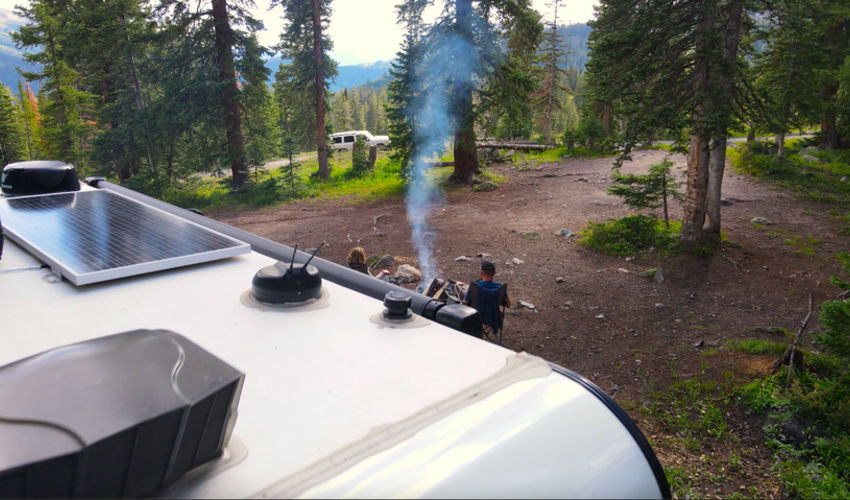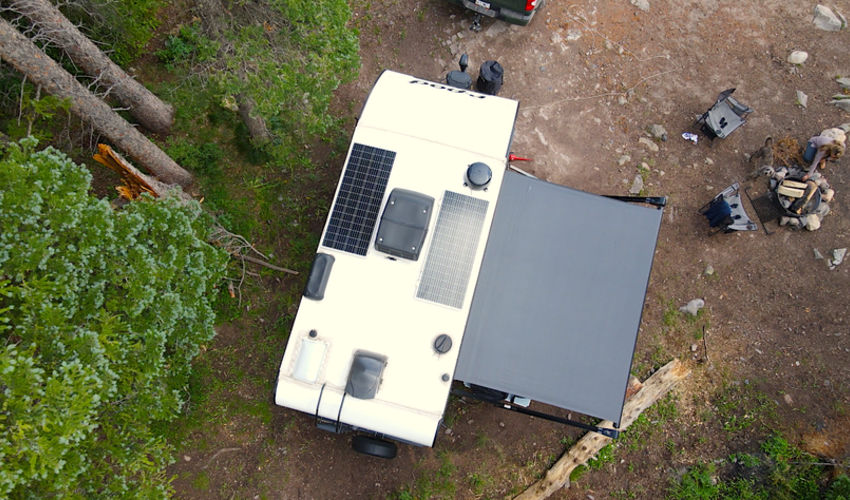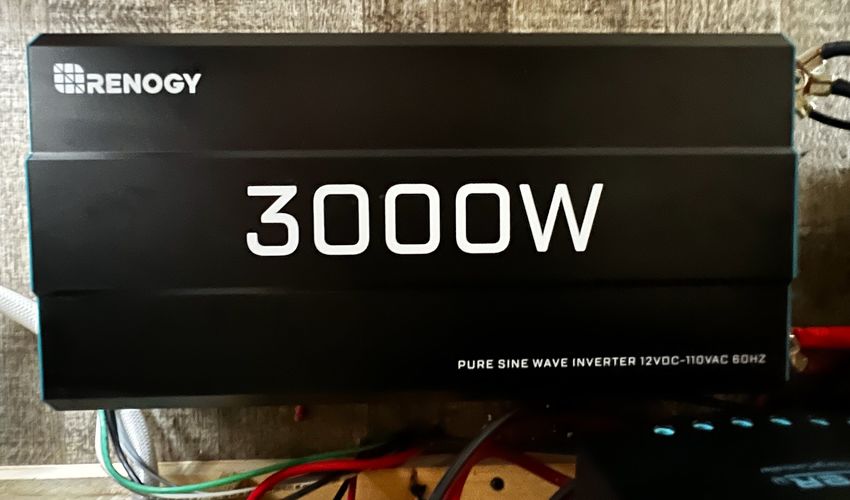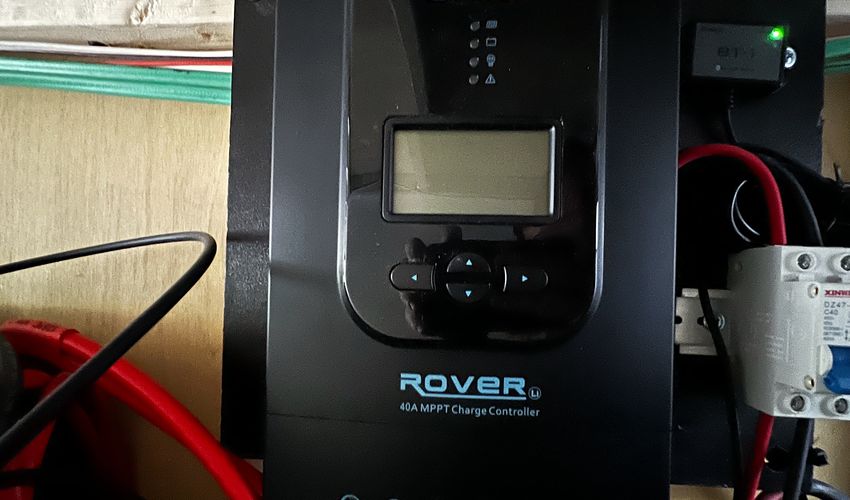Do you want to install RV solar panels on your camper or RV and don't know where to start? From RV solar systems to inverters, and understanding what kind of solar panels are best for an RV, there’s a lot to consider when purchasing solar panels for your rig.
So why get RV solar panels installed? RV solar panels are a great way to power your RV when you’re looking to break away from electric hookup sites and try dry camping or boondocking. When you have RV solar panels and a solar system set up in your RV or camper, you'll be able to power all or some of your RV’s electrical needs like lights, appliances, and even your RV air conditioner.
Whatever size RV you have, before you purchase your RV solar panels, there are a few things you need to know.
RV Solar Panel Systems: Which Is Right For Me?
You have two options to consider when choosing solar panels for your RV or camper
1) Portable RV Solar Panel System
A portable RV solar panel system is the easiest to set up and use. These systems typically plug into a dedicated solar plug on your RV and include one or more 100-watt solar panels that can be attached to your roof with Velcro straps. Other portable solar panels come in a suitcase. You connect the panels via a cord and place them in an area around your RV that gets the most sun.
The portable RV solar panel system is a great choice for RVers who don’t need a lot of power. Maybe you want to use your lights, charge your devices (i.e. phones, computers), and top off your trailer batteries. This option can also be the lowest overall cost to entry, but note you will probably pay more per watt for the convenience of portability.
2) Permanent RV Solar Panel System
Installing permanent RV solar panels is more expensive up front, but this option is the most efficient. You'll get the best bang for your buck per solar watt, can maximize any unused roof space for panels, the panels will be constantly collecting sunlight (i.e. while driving), and the panels don't require setup once you’re parked.
Permanent RV solar panel systems are typically installed by an RV dealer or professional companies that specialize in RV solar panel installation. These systems are designed for those who are trying to maximize solar power not just to charge devices, but also to operate appliances like refrigerators, microwaves, coffee makers, and even air conditioners.
RELATED: 8 Tips For Off-Grid RV Adventures
How Many Solar Panels Do I Need To Run My RV?
First, you need to determine your RV's power needs. RV solar panels are rated in watts, and you'll need to know the wattage (or watt hours) of all the devices you want to run on solar power — think your refrigerator, microwave, phones, TV, etc. For anything that uses electricity in your RV, you need to calculate watt use.
Calculating Watt Use
Locate the amps (or watts) on your devices to determine their usage. You need to convert everything to watts, so if a device only has amps, multiply it by the volts to get watts.
Example: A 120-volt rice cooker that draws 3 amps converts to 360 watts (120 x 3).
Once you know the watts per device used, determine how long you use it daily and multiply it by that “use rate” to get its daily watt usage or watt-hours.
Example: Using the above rice cooker for 30 minutes or 0.5 hours consumes 180 watt-hours (360 watts x 0.5).
Calculating How Many Solar Panels You Need
Once you determine your watt use, you can calculate the number of RV solar panels and how many watts of solar you need.
Most people think that a 100-watt solar panel produces 800 to 1,000 watts of power per day (8 to 10 hours of daylight). Unfortunately, that’s not the case. A conservative rule of thumb is that per 100-watt solar panel, you'll collect about 350 watts per day due to things like weather, optimum sun angle/exposure, and panel efficiencies.
Example: You have one phone at 5 watts to charge for an hour, you use a rice cooker that uses 360 watts for 30 minutes and you use a blow dryer that uses 1,500 watts for 6 minutes.
Phone: 5 (watts) x 1 (hour) = 5 watts
Rice cooker: 360 (watts) x 0.5 (hours) = 180 watts
Blow dryer: 1,500 (watts) x 0.1 (hours) = 150 watts
Total: 5 (watts) x 180 (watts) x 150 (watts) = 355 watts per day
Given this example, a 100-watt solar panel would be sufficient enough to generate enough power to charge your battery and run your devices each day. (Consult with the company installing your panels to determine the panel amount you need.)
What Else Do I Need For My RV Solar Panels?
You'll need more than just solar panels for your RV. There are a few more pieces to pick up, such as:
- Battery bank
- Inverter
- Charge controller
Battery Bank
Batteries store the electricity produced by the solar panel so that your RV can still be powered when there’s no sunlight available (i.e. at night or during bad weather). Technically, solar panels don’t power devices, the solar panels charge the battery and the batteries are what supply the power.
Most batteries are either 24 volts or 12 volts and rated in amps (or Ah). Ideally, you want a battery that has enough capacity to power all your devices and appliances for a couple of days. That way if you have a day of no or low sunlight, you still have some juice to power your devices and appliances.
RELATED: Boondock Basics: The Only Gear Guide You’ll Ever Need
To find out how much battery you need (amps), calculate your watts and divide by volts.
Inverter
An inverter charger converts DC power (produced by solar panels) into AC power that can be used by your RV's electrical system. It also can take AC power and convert it to DC power to charge your batteries.
To determine how large of an inverter you need, take the total watts you’ll use at any given time and multiply that number by 1.25.
Charge Controller
Lastly, you’ll need a charge controller. The main purpose of a charge controller is to create a one-way street for energy. The charge controller takes the energy generated from your solar panels and channels it to your battery bank.
The charge controller also monitors and stops potential issues like overcharging or discharge, which can ultimately damage your battery.
Are RV Solar Panels Worth It?
While the answer might be different for each person, there is time and money involved when deciding to add a solar panel system to your RV or camper.
Installing solar panels on your RV is ideal for those who:
- Are looking to get a little more off-grid when RVing; installing solar panels allows your RV to power up, instead of being connected to campground electric hookups/power.
- Are looking for a more sustainable solution to sourcing energy.
- Prefer the quiet collection of solar power over the hum of a gas-powered generator.
With research, time, and investment you can open up the possibilities of where you can go RVing.














